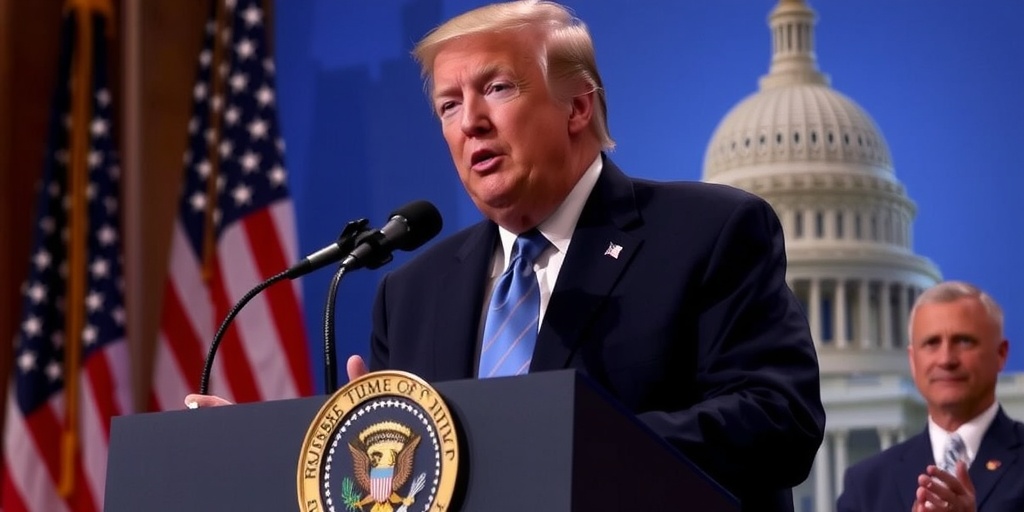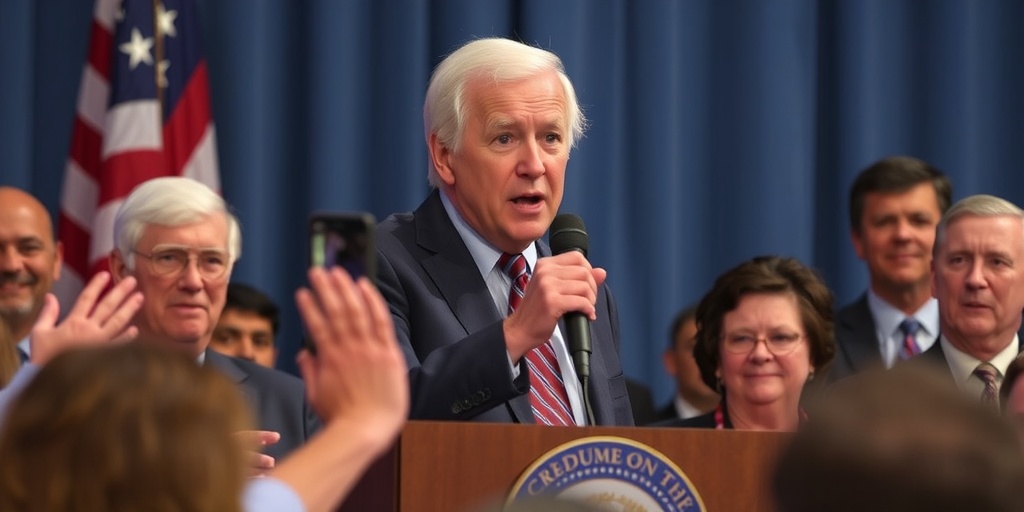Now Reading: House Republicans Resist Trump’s Budget and Tax Cuts
-
01
House Republicans Resist Trump’s Budget and Tax Cuts
House Republicans Resist Trump’s Budget and Tax Cuts

Title: Budgetary Dissonance: Hardline Conservatives Resist Trump’s Spending Blueprint
In a surprising turn of events on Capitol Hill, a contingent of hardline conservative Republicans, many of whom have previously aligned themselves with President Trump, are now voicing their dissent regarding the party’s proposed budget blueprint. This development has emerged as President Trump actively urges support for the spending and tax cuts that could potentially be voted on as early as Wednesday.
Representative Eric Burlison, a two-term congressman representing Missouri’s Ozarks, is among this group of dissenters. Despite his unwavering support for President Trump, Burlison has stated emphatically that he cannot endorse the budget resolution without more substantial spending cuts. “I can’t live with myself if I go back home and I added more debt and deficits without any kind of correction whatsoever,” he declared. His background as a financial analyst and a former state lawmaker who advocated for a balanced budget amendment illustrates his commitment to fiscal responsibility.
This unusual resistance marks a significant departure from the typical dynamic in which Republican lawmakers have shown extraordinary deference to Trump, often bowing to his demands under pressure. However, this time, a dozen hard-line conservatives are standing firm, indicating that they prioritize their commitment to reducing national debt over party loyalty. While the group’s stance might seem counterintuitive given their past alliances with Trump, their insistence on deeper spending cuts reflects a principled stand against what they perceive as fiscal irresponsibility.
During a recent meeting with a select group of House Republicans, Trump urged them to quickly approve the budget plan. While some holdouts softened their opposition following the meeting, the fundamental issue remains: the budget resolution under consideration proposes only about $4 billion in spending cuts over a decade, a fraction of the $2 trillion cuts that House Republicans previously approved. Many in the House fear that endorsing the Senate’s less aggressive cuts might lead to an acceptance of a broadly less ambitious fiscal plan.
Republican leaders contend that the proposed cuts are merely a minimum threshold, designed to provide flexibility to adhere to strict procedural requirements in the Senate. However, hard-line House conservatives remain unsatisfied, particularly with the Senate’s assertion that extending the tax cuts initiated by Trump in 2017 would incur no additional costs, as it is seen simply as the maintenance of current fiscal policy.
Critics within the party have not held back in their condemnation of the Senate’s approach. Representative Andy Ogles of Tennessee expressed frustration, stating, “The American people want and expect results, not more fiscal trickery.” Meanwhile, Representative Jodey Arrington of Texas, who chairs the Budget Committee, labeled the plan as “unserious and disappointing.” Representative David Schweikert of Arizona further criticized it as indicative of “more business as usual at a time when that’s exactly what we’re trying to avoid.”
To move forward, both the House and the Senate must agree on a unified budget resolution. This necessity explains Trump’s increased involvement, culminating in a two-hour meeting where he pleaded for swift action, urging Republicans to “close your eyes and get there; it’s a phenomenal bill” and to avoid “grandstanding.”
Despite Trump’s pressure tactics, a remarkable degree of resistance remains, with core principles guiding some lawmakers’ refusal to back the resolution. Representative Andy Harris of Maryland, chair of the Freedom Caucus, indicated that he declined an invitation to meet with Trump, asserting, “He’s just not going to change my mind.” This sentiment echoes an earlier scene from December, when Trump struggled to rally support for a government funding bill that included a debt limit increase, and numerous Republicans stood their ground against him.
The echoes of previous internal party conflicts are evident; Trump had prominently targeted Representative Chip Roy of Texas during earlier negotiations for his strong opposition to the legislation. Roy, now again at odds with Trump over the current budget resolution, voiced his concerns post-White House meeting, asserting, “The math still doesn’t math.”
As the tension between fiscal responsibility and party loyalty continues to unfold, one thing is clear: the landscape in Congress is shifting. The clash between hardline conservatives and Trump’s budgetary ambitions foreshadows an impending reckoning for the Republican Party as they navigate their fiscal future and address the concerns of their constituents.
Stay Informed With the Latest & Most Important News
Previous Post
Next Post
-
 01New technology breakthrough has everyone talking right now
01New technology breakthrough has everyone talking right now -
 02Unbelievable life hack everyone needs to try today
02Unbelievable life hack everyone needs to try today -
 03Fascinating discovery found buried deep beneath the ocean
03Fascinating discovery found buried deep beneath the ocean -
 04Man invents genius device that solves everyday problems
04Man invents genius device that solves everyday problems -
 05Shocking discovery that changes what we know forever
05Shocking discovery that changes what we know forever -
 06Internet goes wild over celebrity’s unexpected fashion choice
06Internet goes wild over celebrity’s unexpected fashion choice -
 07Rare animal sighting stuns scientists and wildlife lovers
07Rare animal sighting stuns scientists and wildlife lovers





















